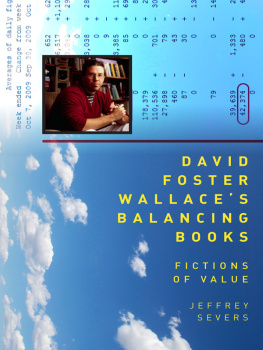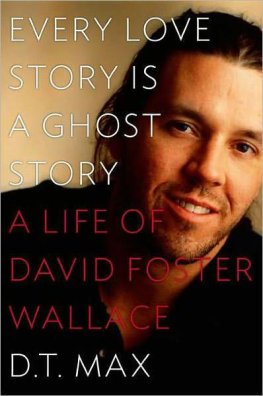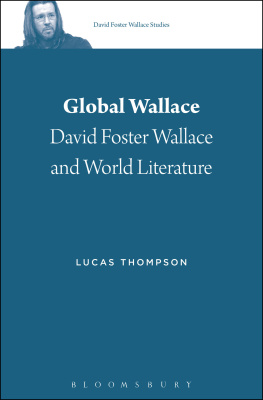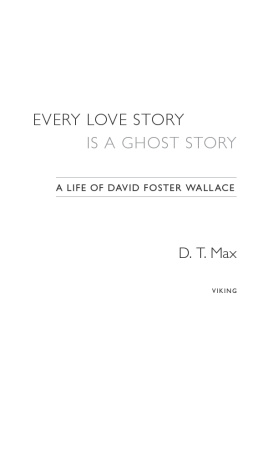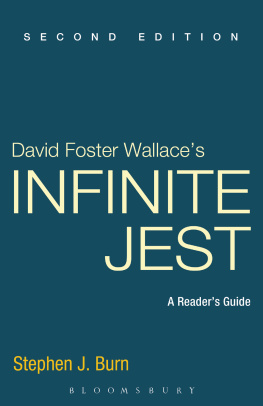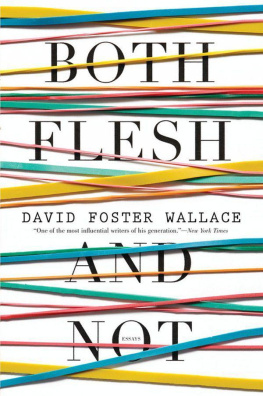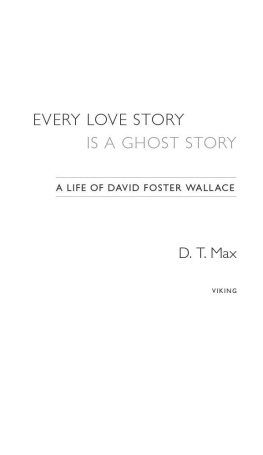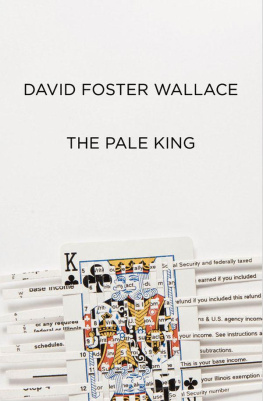Table of Contents
DAVID FOSTER WALLACES BALANCING BOOKS
DAVID FOSTER WALLACES BALANCING BOOKS
FICTIONS OF VALUE
JEFFREY SEVERS
COLUMBIA UNIVERSITY PRESS
NEW YORK
Columbia University Press
Publishers Since 1893
New York Chichester, West Sussex
cup.columbia.edu
Copyright 2017 Columbia University Press
All rights reserved
E-ISBN 978-0-231-54311-8
Library of Congress Cataloging-in-Publication Data Names: Severs, Jeffrey, 1974 author.
Title: David Foster Wallaces balancing books : fictions of value / Jeffrey Severs.
Description: New York : Columbia University Press, 2017. |
Includes bibliographical references and index.
Identifiers: LCCN 2016019208 (print) | LCCN 2016030061 (ebook) |
ISBN 9780231179447 (cloth : alk. paper) | ISBN 9780231543118 (e-book)
Subjects: LCSH: Wallace, David FosterCriticism and interpretation.
Classification: LCC ps3573.a425635 z864 2017 (print) | LCC ps3573.a425635 (ebook) | DDC 813/.54dc23
LC record available at https://lccn.loc.gov/2016019208
A Columbia University Press E-book.
CUP would be pleased to hear about your reading experience with this e-book at .
Cover design: Archie Ferguson
Cover image: Gary Hannabarger
CONTENTS
T HE FOLLOWING texts by David Foster Wallace are cited parenthetically with abbreviations. Full bibliographic information is in the bibliography.
NOVELS AND SHORT STORY COLLECTIONS
| The Broom of the System | B |
| Girl with Curious Hair | GCH |
| Infinite Jest | IJ |
| Brief Interviews with Hideous Men | BI |
| Oblivion | O |
| The Pale King | PK |
ESSAY COLLECTIONS, NONFICTION, AND INTERVIEWS
| A Supposedly Fun Thing Ill Never Do Again | SFT |
| Both Flesh and Not | BF |
| Conversations with David Foster Wallace, ed. Stephen J. Burn | CW |
| Consider the Lobster | CL |
| David Foster Wallace: The Last Interview | LI |
| Everything and More: A Compact History of Infinity | EM |
| This Is Water: Some Thoughts, |
| Delivered on a Significant Occasion, |
| About Living a Compassionate Life | TW |
T HANK YOU to the University of British Columbia for grant and leave support and to my colleagues in the English Department, especially Ira Nadel. Thanks to the library staff at the Harry Ransom Center at the University of TexasAustin; to the editorial staff at Columbia University Press, especially Philip Leventhal, and the anonymous reviewers of my manuscript; to my research assistants, Angus Reid, Madeline Gorman, and especially Jeff Noh and Jae Sharpe, who were both indispensable to the books completion; to the students in my seminars, who spurred many insights herein; to Eric Bennett, Brian Bremen, Ralph Clare, Sin Echard, Matt Gartner, Jeff Hoffman, Chris Leise, Linda Meng, Geordie Miller, Travis Miles, Jason Puskar, Matt Rubery, Adam Seluzicki, Charles Seluzicki, and Jeff Waite, who each helped with conversation and support at crucial moments; to Steve Moore, who gave me and my archival research a Texas home; and to the staff and management of Vancouvers City Square Shopping Centre Food Court, where many of these pages were written.
Above all, I thank my mom and dad, my sisters, and my entire family for loving me and educating me. And thanks beyond thanks to Christina Seluzicki, for showing me what value and gifts can be.
An earlier version of portions of . Reprinted by permission of the publisher. All quotations from the Wallace Papers at the Harry Ransom Center are published with the permission of the David Foster Wallace Literary Trust.
VALUE, GROUND, AND BALANCING BOOKS
W HEN DAVID Foster Wallace committed suicide on September 12, 2008, amid the tragedy one of the most surprising details to emerge was news of the project he had left unfinished: a novel on the unlikely subject of the Internal Revenue Service. Mentioning in its opening pages bookkeepings double-entry method (PK 9) and featuring a section rendered in doubled columns, The Pale King proved to be thematically and formally concerned with balance booksperhaps it constituted a kind of ledger for American culture, assessing its credits and debits. That Wallace would take consuming interest in the balance sheets of a federal agency should not have come as a shock, though. He had throughout his work been subtly invested in images of balance and reciprocity, as well as mutuality and the socially shared. He pursued balance on levels that extended from the bodily and the interpersonal to the spiritual, sociological, financial, geopolitical, and cosmic. Wallace showed characters struggling to place two feet on the ground and restlessly sought to balance the books for a chaotic culture (and determine the moral authority on which one could do so). Seeing him as such casts new light on the reasons his writing has signaled a sharp turn against postmodernist tenets and a galvanizing new phase in contemporary global literature.
In this book, finding unifying motifs for aspects of his work that have gone largely unexplored, I detail Wallaces quest for balance in a world of excess and entropy; show him probing the unbalanced ledgers that ideas of gift, contract, and commonwealth raised at breakthrough moments in his career; and, adding a third area of his collegiate interests to the portrayal of him as the philosopher-novelist, pose him as at bottom a rebellious economic thinker, one who not only satirized the deforming effects of money but threw into question the logic of the monetary system, often acting as a historian of financial markets, the Great Depression, and the precarious fate of the social-welfare achievements of the New Deal. Fusing readings of metaphysical, existential, and moral themes with this sort of historicization, I demonstrate the great relevance his work has to the neoliberal nation that he tragically left behind in 2008, just as it started to feel the impact of a tremendous crisis in what the accountants double ledger ideally helps maintain: the connection between price and value, one of Wallaces continual subjects.
For Wallace, value, kept loose and polysemous, could connect depressions internal discourse of low self-worth and spiritual impoverishment to larger cultural formations of financialization and economic crisis under neoliberalism. Through value he redefined both the currency of human exchange and the act of calculation within postmodernity, with huge ramifications for his fictions moral force. Value, balance, and ground are the governing motifs of this study, all interconnected at the root of Wallaces philosophically educated imagination. Together these topics make his works axiological fiction, a term I explain fully later in this introduction, along with the varying definitions of value he continually compared.
Many of Wallaces individual works have already been well examined by critics for their treatments of solipsism; therapy; technological mediation; philosophical and literary influences such as Wittgenstein, Kierkegaard, and John Barth; and the relationship of irony and sincerity (a topic I examine in greater detail later). But needed now is a synthetic reading, based in his whole career and archive, of Wallaces deep engagement with more traditional social and political problems. What can now be performed is a reconciling of the opposed categories in Pankaj Mishras suggestive sense, voiced in a review of

